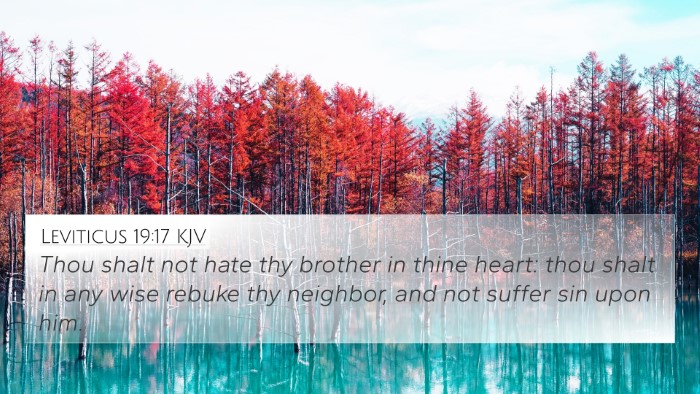Understanding 2 Thessalonians 3:15
Verse: 2 Thessalonians 3:15 - "Yet do not regard him as an enemy, but warn him as a brother."
This verse presents a significant teaching on how to approach those who have lost their way or are behaving inappropriately within the Christian community. The Apostle Paul emphasizes the importance of maintaining relationships with believers who may have wandered off the path of righteousness, urging members of the church to correct them with gentleness and love rather than contempt or hostility.
Commentary Insights
- Matthew Henry: He focuses on the necessity of approaching errant believers with compassion, noting that while the individual may be acting against the teachings of Christ, they should not be treated as enemies. Instead, Paul encourages a brotherly warning, showing the need for brotherly love and correction.
- Albert Barnes: Barnes highlights that this verse illustrates the distinction between correction and condemnation. He clarifies that the objective should be restoration rather than punishment, urging the faithful to advise and guide those who err, fostering a spirit of unity within the church.
- Adam Clarke: Clarke elaborates on the concept of treating a wayward brother as a family member. He suggests that the language used by Paul indicates a profound understanding of community, where admonition is seen as a responsibility borne out of love, rather than judgment.
Key Themes and Interpretations
This verse depicts some critical themes in Christian theology:
- The Importance of Community: Believers are interconnected and thus have a duty to look out for one another, encouraging spiritual growth.
- Restoration vs. Rejection: This passage encourages restoration as the goal for those who falter, opposing a tendency towards alienation or shunning.
- Brotherly Correction: The Christian community should embody a spirit of brotherhood; admonishing in love rather than condemnation exemplifies true Christian love.
Cross-References for Deeper Understanding
In studying 2 Thessalonians 3:15, the following Bible verses provide valuable cross-references:
- Galatians 6:1 - "Brothers, if someone is caught in a sin, you who live by the Spirit should restore that person gently." This verse complements the idea of gentle correction.
- Matthew 18:15 - "If your brother or sister sins, go and point out their fault, just between the two of you." This echoes the principle of private admonition.
- James 5:19-20 - "My brothers and sisters, if one of you should wander from the truth and someone should bring that person back, remember this: Whoever turns a sinner from the error of their way will save them from death." This emphasizes the importance of correction for the sake of salvation.
- 1 Thessalonians 5:14 - "And we urge you, brothers and sisters, warn those who are idle and disruptive, encourage the disheartened, help the weak, be patient with everyone." This verse showcases a similar call to community guidance.
- Romans 15:1-2 - "We who are strong ought to bear with the failings of the weak and not to please ourselves." This highlights the responsibility believers have to support one another.
- Titus 3:10 - "Warn a divisive person once, and then warn them a second time. After that, have nothing to do with them." This addresses the balance between warning and addressing disruptive behavior.
- 2 Timothy 2:24-25 - "And the Lord’s servant must not be quarrelsome but must be kind to everyone, able to teach, not resentful. Opponents must be gently instructed, in the hope that God will grant them repentance leading them to a knowledge of the truth." This reinforces the importance of gentleness in correction.
- 2 Corinthians 2:7 - "Now instead, you ought to forgive and comfort him, so that he will not be overwhelmed by excessive sorrow." This shows how correction should lead to forgiveness and comfort.
- Colossians 3:16 - "Let the message of Christ dwell among you richly... with all wisdom through psalms, hymns, and songs from the Spirit, singing to God with gratitude in your hearts." This reflects on nurturing a spirit-filled community.
Conclusion
2 Thessalonians 3:15 invites reflection on how Christians interact with fellow believers who stray from the truth. This verse, framed by the insights of revered biblical commentators, encourages a loving and compassionate approach to correction, highlighting the distinct community ethos that defines the Church. Through the suggested cross-references, believers can explore further biblical connections that underline themes of admonishment, restoration, and unity that are vital for a healthy spiritual community.

















